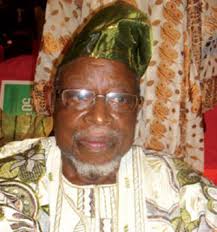Nigeria’s King of Comedy attains a landmark age
As Nigeria’ s burgeoning entertainment industry continues to grow from strength to strength, those individuals whose talent and determination helped to establish it must never be forgotten. One of the most prominent of these distinguished people is Moses Olaiya Adejumo, MON, alias Lamidi Sanni Oropo, Baba Sala, who recently celebrated his eightieth birthday.
Olaiya’s life and career accurately reflect the trajectory of the entertainment scene in the country. Although he worked as a Sanitary Inspector, he did not permit his love of acting, music and comedy to lie fallow, and took up these pursuits after closing hours.
In 1964, Olaiya led a highlife group called the Federal Rhythm Dandies whose membership included a young Sunday Adeniyi, who would rise to global fame as the juju maestro, King Sunny Ade. In 1969, he became a full-time stage actor and comedian, setting up the Moses Olaiya International Alawada Theatre Limited. The group toured extensively and visited many towns in Nigeria’s south-west, as well as the United Kingdom and the United States.
Olaiya was quick to exploit the potential of television when WNTV/WNBS was set up in the Western Region, and his Yoruba-language comedies were extremely popular for decades. He was also a pioneer in the emerging movie industry and was one of the first producers of indigenous-language films. Some of the most notable were Orun Mooru (1982), Aare Agbaye (1983), Mosebolatan (1985) and Agba Man (1992).
There can be no doubting the extent of Olaiya’s talent. Like Charlie Chaplin, he was a natural comedian who could provoke laughter without saying a word. His trademark props – enormous bow-tie, gigantic spectacles, over-large shoes, alarm clock and pipe – combined with his hilarious demeanour to create an unforgettable character that was synonymous with entertainment for much of the seventies and the eighties.
Unlike many of his successors who are apparently unable to draw upon their cultural heritage for much of their material, Olaiya was solidly rooted in his culture, and able to exploit its Christian, Muslim and traditionalist elements, even though he was himself a Christian. His nearly five decades in the industry are untainted by scandal or improper behaviour. It is no surprise that he was made a Member of the Order of the Niger (MON) by the Obasanjo administration in 1978.
Not surprisingly for one who was always at the cutting-edge of the entertainment industry, Olaiya has also had to endure many of its shortcomings as well. His Orun Mooru was so heavily pirated that it nearly drove him to bankruptcy, given the huge loans he had taken to make the film. Many of his television comedies are lost to history, no thanks to the lack of an effective archival system in the television sub-sector. It is doubtful if he receives royalties for his films that are still shown.
Nigeria can celebrate this remarkable man by seeking to ensure that it creates an entertainment industry worthy of his successors. The country failed to heed the warning implicit in Olaiya’s own bitter experiences with piracy; it must now take decisive steps to ensure that those who attempt to profit from the creativity of others pay a high price for their actions.
Films, television programmes and other intellectual property must be properly stored for the entertainment of future generations; it is depressing that the works of Chaplin, Harold Lloyd and other foreign comedians who existed decades before Olaiya can still be found.
Perhaps most importantly, greater efforts should be made to draw upon the wisdom of veterans like Olaiya whose vision and determination enabled them to carve out a path for others to follow. May his life continue to serve as an inspiration for his compatriots.
‘Nigeria can celebrate this remarkable man by seeking to ensure that it creates an entertainment industry worthy of his successors. The country failed to heed the warning implicit in Olaiya’s own bitter experiences with piracy; it must now take decisive steps to ensure that those who attempt to profit from the creativity of others pay a high price for their actions’



Be the first to comment